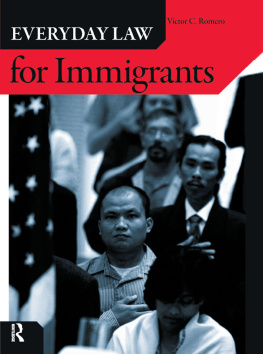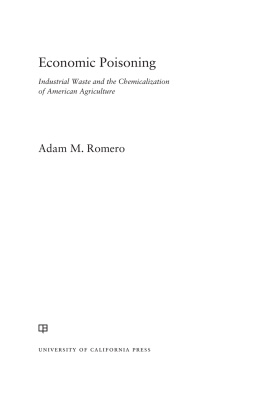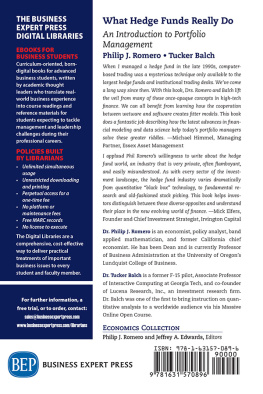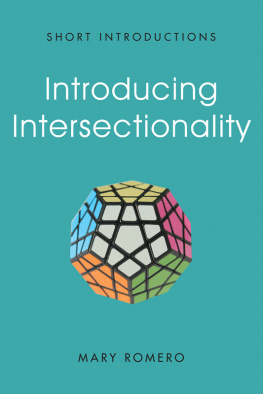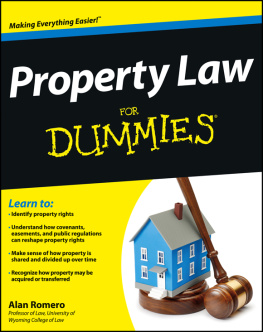Everyday Law for Immigrants
The Everyday Law Series
Edited by Richard Delgado and Jean Stefancic University of Pittsburgh Law School
Everyday Law for Individuals with Disabilities
Ruth Colker and Adam Milani (2005)
Everyday Law for Children
David Herring (2006)
Everyday Law for Gays and Lesbians
Anthony C. Infanti (2007)
Everyday Law for Consumers
Michael L. Rustad (2007)
Everyday Law for Latino/as
Steven W. Bender, Raquel Aldana,
Gilbert Paul Carrasco, and Joaquin G. Avila (2008)
Everyday Law for Immigrants
Victor C. Romero (2009)
Forthcoming
Everyday Law for the Elderly
Lawrence Frolik
Everyday Law for African Americans
Harold McDougall III
Everyday Law for Immigrants
Victor C. Romero
First published 2009 by Paradigm Publishers
Published 2016 by Routledge
2 Park Square, Milton Park, Abingdon, Oxon OX14 4RN
711 Third Avenue, New York, NY 10017, USA
Routledge is an imprint of the Taylor & Francis Group, an informa business
Copyright 2009, Taylor & Francis.
All rights reserved. No part of this book may be reprinted or reproduced or utilised in any form or by any electronic, mechanical, or other means, now known or hereafter invented, including photocopying and recording, or in any information storage or retrieval system, without permission in writing from the publishers.
Notice:
Product or corporate names may be trademarks or registered trademarks, and are used only for identification and explanation without intent to infringe.
Library of Congress Cataloging-in-Publication Data
Romero, Victor C.
Everyday law for immigrants / Victor C. Romero.
p. cm. (The everyday law series)
Includes bibliographical references and index.
ISBN 978-1-59451-627-6 (hardcover : alk. paper)
ISBN 978-1-59451-628-3 (paperback : alk. paper)
1. Emigration and immigration lawUnited States. I. Title.
KF4819.R663 2008
342.73082dc22
2008024313
ISBN 13: 978-1-59451-627-6 (hbk)
ISBN 13: 978-1-59451-628-3 (pbk)
Designed and typeset by: Mulberry Tree Enterprises
To Corie, Ryan, Julia, and Matthew
Contents
I am blessed to know many individuals who have graciously supported me during this project.
First and foremost, thanks to Richard Delgado and Jean Stefancic for inviting me to write this book for their Everyday Law series. Their contributions to the legal academy and to civil rights scholarship have been numerous and significant; their kindness and mentoring to me have been invaluable. Richard went the extra mile by reading early drafts of each chapter and providing detailed feedback. His keen editorial eye helped improve the manuscript tremendously. At Paradigm Publishers, thanks go to Beth Davis and Carol Smith for shepherding the project from start to finish with patience and thoughtfulness.
I am especially grateful to Won Kidane (Seattle University School of Law), Melissa Landrau-Rodriguez (Penn States College Assistance Migrant Program), and Stephen Fotopulos (Tennessee Immigrant and Refugee Rights Coalition) for graciously reviewing an earlier draft of the book and steering me away from major errors or omissions. Insights from their tireless work on behalf of the migrants they serve helped me reexamine the issues afresh. Katrina Hall provided excellent research assistance by developing the charts and bibliography for the book; she also enjoys the dubious distinction of being my only research assistant with whom I have been able to converse in Tagalog. Cecily Giardina supplied useful information on accessing government resources in print and online. All errors that remain are, of course, mine alone.
Family, friends, and colleagues have provided other equally important sustenance. Phil McConnaughay, my dean at Penn State, has been particularly supportive of all my work. My colleagues in the Office of Academic Affairs at the law school gave me the flexibility to meet my deadlines. And my family in the Philippines and SingaporeRoberta and Roel, Georgy, Ben, Bets, and Billyhas been a constant source of strength and example of grace. I would be remiss if I did not mention the support of the Honorable David V. Kenyon, former U.S. District Judge of the Central District of California. Judge Kenyon was the first person who genuinely believed I could be a law teacher, and I will always be grateful for his encouragement.
Finally, and most important, I thank my wife, Corie Phillips Romero, and my kids, Ryan, Julia, and Matthew, for their patience during this long process. They all had to endure my occasional bouts of self-doubt as I slogged through the manuscript and publication process. Having adopted all three of our children from abroad and having immigrated myself, I am certain that our entire family would find our little sacrifice valuable if this book helps even a few readers better understand how we in America treat noncitizens in our midst.
The United States has long been a nation of immigrants. From the Europeans who once thronged Ellis Island to the Asians who journeyed to Angel Island in the San Francisco Bay, people from all over the world have traveled to America for centuries in search of a new place to call home. Perhaps for just as long, the United States has responded to this migration with ambivalence, sometimes welcoming immigrants with open arms, other times seeking to return them to their places of birth. This schizophrenic attitude has led to a similarly schizophrenic immigration law history, one that reflects the tension between ensuring that immigrants assimilate into their adopted homeland and simultaneously protecting the interests of U.S. citizens and their nation.
In the tradition of other books in this series, Everyday Law for Immigrants aims to provide a comprehensive understanding of the basic challenges immigrants and foreign nationals face, not just within formal immigration policy (i.e., the law governing when noncitizens may enter, and must leave, the United States) but within U.S. domestic law generally, including rules promulgated by federal, state, and local entities that affect noncitizens (sometimes referred to as alienage law). This book aims to present a concise thematic overview of both historical and current U.S. immigration law and procedure while also answering alienage law questions of interest to noncitizens currently residing here, relating to topics such as employment and education. In short, I intend that noncitizens and their advocates will use this book not only to gain a birds-eye view of U.S. immigration history, practice, and procedure but also to constructively address the many legal issues within immigration and alienage law that affect foreigners who reside here.
Despite its comprehensiveness, this book can only skim the surface when addressing the most common legal issues that affect noncitizens. Should your situation appear more complicated than the examples this book provides, you should seriously consider hiring a well-respected immigration attorney to assist you. A lawyers help will go a long way toward ensuring that the information you have gleaned here is up-to-date and specifically applies to your unique circumstances.
Now, on to a detailed description of each chapter, and what I aim to accomplish.
will be to emphasize how the Supreme Court has essentially deferred to Congresss lawmaking authority over immigration law, only rarely intervening to curb that power and then doing so mostly through immigrant-friendly statutory interpretation rather than by appealing to unalienable constitutional rights. This so-called plenary power doctrine has allowed Congress to provide noncitizens, even longtime legal permanent residents, fewer protections under the Constitutions due process and equal protection clauses than it grants to U.S. citizens for similar discriminatory conduct. Fortunately, outside the realm of pure immigration lawwithin so-called alienage lawwhen individual state and local governments attempt to bar noncitizens by limiting their access to public goods and services, the Supreme Court has been more willing to protect noncitizens from governmental overreaching.


